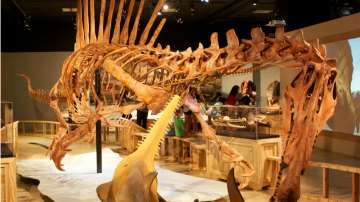Scientists have revealed that Spinosaurus had paddle-like tail bones which indicate its aquatic tendencies. The researchers always suspected this due to its crocodilian snout and spiky sail.
A study published in Cretaceous Research has confirmed that the Spinosaurus swam with the best of them. Taphonomic evidence gathered from the Kem Kem riverbed in the Moroccan Sahara Desert supports this conclusion, with excavations uncovering over 1,200 fossilized teeth at the site.
According to CNET's report, Spinosaurus teeth accounted for almost half of the findings, with barely any evidence of teeth from land-dwelling dinosaurs. This supported the conclusion that the Spinosaurus was most likely an aquatic dinosaur -- specifically, a river-dwelling predator.
David Martill, the co-author of the study, said that the presence of Spinosaurus teeth was almost certainly a reflection of an aquatic lifestyle. "An animal living much of its life in water is much more likely to contribute teeth to the river deposit than those dinosaurs that perhaps only visited the river for drinking and feeding along its banks," he said.

